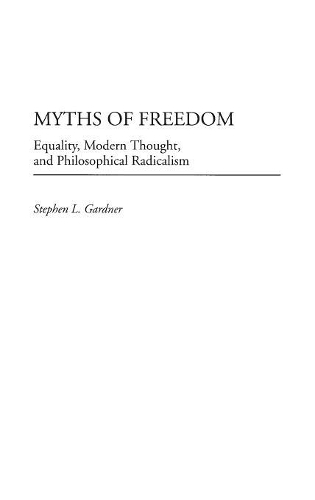
Myths of Freedom: Equality, Modern Thought, and Philosophical Radicalism
(Hardback)
Publishing Details
Myths of Freedom: Equality, Modern Thought, and Philosophical Radicalism
By (Author) Stephen L. Gardner
Bloomsbury Publishing PLC
Praeger Publishers Inc
30th August 1998
United States
Classifications
Tertiary Education
Non Fiction
History of ideas
123.5
Physical Properties
Hardback
216
Width 156mm, Height 235mm
539g
Description
The status of the modern age has long been debated, but since post-modernism, it has assumed centrality as if it were the issue of philosophy. Gardner brings a new approach to the problem of modernity, based on theories of Ren Girard and others. While modernity is commonly seen as an ideological project or interpretation of Being, Gardner sees it in terms of the structure of human relations and their impact on philosophy. The decisive feature of the modern world is what Tocqueville called equality of conditions, which has wrought a revolution in the self-image of the individual and in one's dealings with others. But, in the process, it has replaced old mythsdebunked by the Enlightenmentwith new ones of its own invention. Hence emerged the myths of freedomof the autonomy of the self or the spontaneity of passion, or later, of emancipation or authenticityfrom Descartes to Heidegger. Gardner probes the central issue: To what extent have philosophers clarified these myths, or, perhaps, succumbed to their illusions. This inquiry attacks the major dogmas of contemporary criticismsuch as the primacy of the question of technology, or of the quarrel of ancients and moderns. It restores the philosophical legitimacy of anthropology, both in opposition to Heidegger's ontology and to the deconstructive retreat into an idealism, and in contrast to classical political philosophy. This provocative analysis will be of interest to philosophers, political theorists, and others dealing with the problem of modernity.
Reviews
.,."the value of the work lies in its provocative nature. It is a strong challenge to the traditional framework in which debates about the nature of the individual subject and modernity have taken place."-Perspectives on Politcal Science
...the value of the work lies in its provocative nature. It is a strong challenge to the traditional framework in which debates about the nature of the individual subject and modernity have taken place.-Perspectives on Politcal Science
..."the value of the work lies in its provocative nature. It is a strong challenge to the traditional framework in which debates about the nature of the individual subject and modernity have taken place."-Perspectives on Politcal Science
Author Bio
STEPHEN L. GARDNER is an Associate Professor of Philosophy at the University of Tulsa. His earlier writings have appeared in scholarly journals, including Vera Lex.
